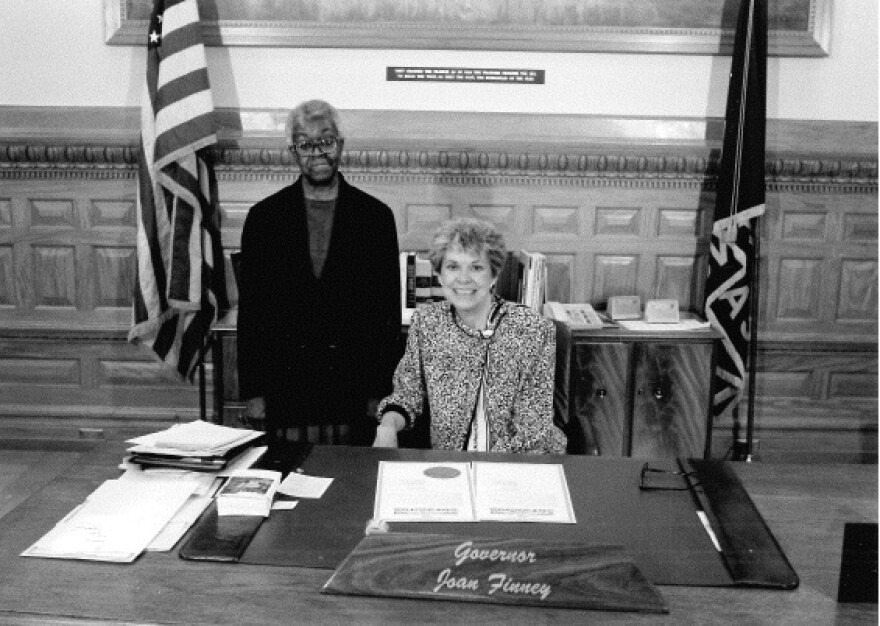Gwendolyn Brooks lived in Topeka for just a few weeks after she was born. But the iconic poet – Brooks was the first African-American writer to win the Pulitzer Prize — still has relatives in Kansas, and they’re ready to celebrate what would have been her 100th birthday.
“I’m very happy and proud when I hear so many people here in Topeka that really had a lot of respect for her and the gift God had given her,” says Carolyn Wims Campbell, Brooks’ first cousin once removed (Brooks and Campbell’s father were cousins).
Brooks is considered a Chicago poet. Her parents traveled from that city to Topeka specifically so they could be near family for her birth on June 7, 1917.
“I think she would be amazed that Topeka is having such a big celebration. Other than this being her birthplace, she really didn’t feel that need to come here on a regular basis [after] her aunts and uncles all passed away,” Campbell admits.
But Eric McHenry, who recently ended his term as Kansas poet laureate, has been thinking about a big celebration for years.

McHenry, an associate professor of English at Washburn University, had more than 100 speaking engagements around the state as poet laureate. One of his favorite poems to recite from memory was Brooks’ “The Bean Eaters,” which begins: They eat beans, mostly, this old yellow pair./Dinner is a casual affair.
“It’s a marvelous poem about a poor elderly couple, really just eating beans in their little rented back room,” McHenry says. “Simply by sketching their lives in really vivid detail, Brooks opens a window into all the richness of their experience, even though materially they’re very poor.”
Now, McHenry and eleven other poetry lovers have organized Saturday’s Brooksfest, an afternoon event at the Brown vs. Board of Education National Historic Site in Topeka — significant partly because Brooks’ mother taught at the famously segregated Monroe School in the 1910s.

They’re bringing in some literary star power. Speakers include Topeka native Elizabeth Farnsworth, cohost of PBS’ Newshour, and keynoting the day’s festivities is Kevin Young, who also spent formative years in Topeka and is now the poetry editor of The New Yorker and director of the New York Public Library's Schomburg Center for Research in Black Culture.
Thomas Fox Averill, a retired Washburn professor, taught Young’s first poetry workshop and recognized Young’s talent even as a 13-year-old — coincidentally, Brooks’ age when she published her first poem.
The two poets have several things in common, says Averill.
“It’s hard to articulate what makes Brooks so good. It’s her appreciation of the complexity inside of the simple, and her ability to write about it in such an achingly beautiful way,” he says.
“I think that Kevin has that same capacity," Averill says. "Somehow the writing speaks directly to your heart and your mind at the same time. That sort of dual mental and emotional quality that can be in language is something that Brooks teaches all of us who are trying to write.”
Averill is also scheduled to read on Saturday, as is the state’s new poet laureate, Kevin Rabas, and another former poet laureate, Wyatt Townley.
Brooks’ distant cousin Campbell is part of the line-up, too.
Campbell fondly remembers Brooks’ visits, though the poet was 25 years her elder. (Brooks died in 2000.)
“She was a generous person. She was a strong-willed person. She was a no-nonsense person who was gifted and knew how to share her talent with the world,” Campbell says.
And she has a bit of commentary about what may be Brooks’ most famous piece.
“What gets me is that everybody loves ‘We Real Cool,’” she says. “And there are so many more.”
Brooks authored 20 books. It was for her 1949 collection Annie Allen that she won the Pulitzer in 1950.
Still, at least two participants at Brooksfest will read personalized versions of “We Real Cool,” including Campbell’s niece, Annette Wims, also of Topeka.
Brooksfest, 1-5 p.m. Saturday, June 10, at the Brown vs. Board of Education National Historic site, 1515 SE Monroe St., Topeka, Kansas. Refreshments served. Free and open to the public.
Follow KCUR contributor AnneKniggendorf on Twitter, @annekniggendorf.




